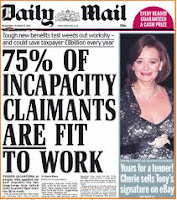
 ...it's useful to journalists, politicians, salespeople - in fact almost anyone with a story or a commodity to sell instinctively reaches for this device to further their cause. It's a lovely word in its own right. Hyperbole! It rolls off the tongue and is impressive when sparingly used in an analytical essay for A Level English Lit. It's also much easier to spell than exaggerate.
...it's useful to journalists, politicians, salespeople - in fact almost anyone with a story or a commodity to sell instinctively reaches for this device to further their cause. It's a lovely word in its own right. Hyperbole! It rolls off the tongue and is impressive when sparingly used in an analytical essay for A Level English Lit. It's also much easier to spell than exaggerate.Kelvin MacKenzie, who writes for the Sun and occasionally for the Spectator, during a recent late-night Sky News press review, cheerfully admitted that his job as a one-time editor was to make the reader of his paper angry and shocked.
That is what sells some newspapers and increases their readership. It panders to a need in many of us to find someone or something to blame for the ills of the world or to feel smugly self-righteous that we belong to a 'respectable' majority.
Hyperbole magically transforms the subject of a headline or an article from a take-it-or-leave-it prospect into a compelling one. Who will ever forget the ubiquitous 'FREDDIE STARR ATE MY HAMSTER' headline, and how many resisted the temptation to read the related article?
Hyperbole, then, can be a way for a newspaper to grab the attention of casual buyers scanning newsstands for an interesting read. But there is a much more dangerous and worrying use for 'hype'.
Remember back in the early days of this Coalition government, when suddenly the right-leaning press were for several weeks full of stories of how some benefit claimants were cheating the taxpayer? Those stories which abounded then came immediately before an announcement by Ian Duncan Smith as to how he and his department were to revolutionise the welfare system. Here's a link, from last November, to take you to a short piece from the BBC on the announcement and a linked video clip:http://tinyurl.com/5sg7wmz
There have been many examples of statements from the government leaked to the press over the years. This practice has the effect of testing the water of public opinion and gauging the reaction of the political opposition,thus enabling Ministers to be ready for any difficult questions which may arise.
What has become much more prevalent over the recent months, is something truly insidious which seems specifically designed to turn one particular group in society against another. Using facts, often distorted and easily challenged, some of the papers have used the anger and resentment, generated by lurid and derogatory articles, to prime the general public into accepting new government policies which they would perhaps reject in other circumstances.
The question remains: is the government using the press, or is the press using the government?
Rosie Robertson